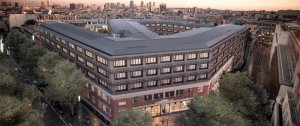Coordinators : Matthieu Labousse (CNRS & Lab. Gulliver) & Ludwik Leibler (Distinguished Professor at ESPCI Paris & Lab. Gulliver).
Contacts : matthieu.labousse@espci.fr & ludwik.leibler@espci.fr
site web https://www.gulliver.espci.fr/?-Accueil-
Starting from January 2019.
Key words : Self-healing, smart materials, fracture, stochastic thermodynamics.
Self-healing polymers often combine the crossed-linked network structure of rubbers or gels and dynamic supramolecular bonds1. Paradoxically self-healing properties in “cut and repair” experiments have been widely documented, the resistance to fracture or tearing of self-healing materials is an unchartered territory. This postdoctoral project aims at addressing theoretically the question of the interplay between self-organization, reversible bonding and self-healing and fracture resistance.
It is a numerically/theoretically-oriented project. Applicants should possess strong skills in stochastic thermodynamics and related numerical methods. A good level in programming (preferably C++ or Matlab, Python) is a requirement. Knowledge in polymer physics and physical-chemistry would be a true asset. Gulliver lab has important local computational resources as well as an access to massive clusters for further intensive computations. An outstanding applicant who likes interacting with experimentalists is of course the most welcome.
The applicant will conduct the theoretical aspects of the projects and will be hosted in Gulliver. Gulliver located at ESPCI in the center of Paris, is a very active and multidisciplinary laboratory whose research fields range from theoretical physical-chemistry, soft matter, molecular programming, statistical physics to microfluidics.
References
1 P. Cordier, F.Tournilhac, C. Soulié-Ziakovic & L. Leibler Nature 451, 977 (2008)








